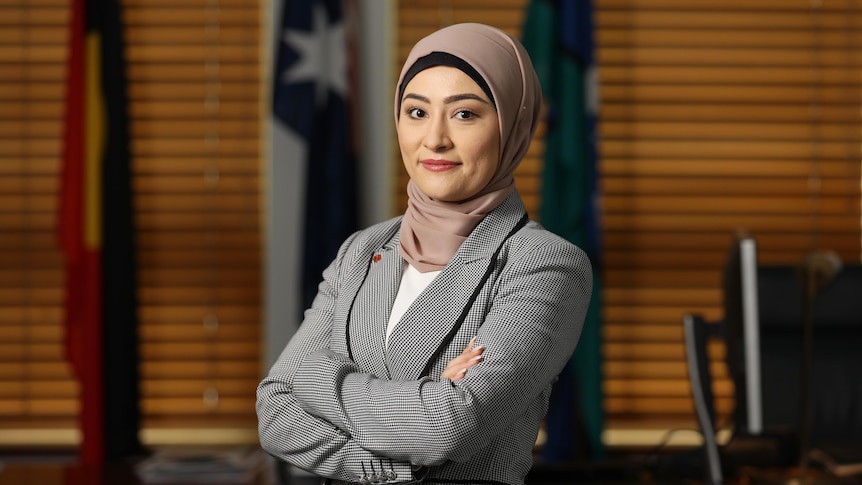Tucked away in Parliament House office, once occupied by Tony Abbott and Clive Palmer, now sits the 47th Parliament’s youngest new member.
At age 27, Senator Fatima Payman is making history and it’s a pretty big adjustment.
“I’ve told my friends ‘please don’t call me senator’. I’m still getting used to the title,” she laughed.
Senator Payman’s small team consists of young women just as eager as her for the first sitting fortnight of the new parliament.
It’s safe to say Fatima Payman is vastly different from the men who’ve sat at this very desk and in the Senate chamber she now frequents.
She came to Australia with her family as a refugee from Afghanistan in 2003 and was raised in the northern suburbs of Perth, where she became a union organiser.
Now, she’s the youngest member of the 47th Parliament and the first Afghan-born hijab-wearing senator. She says she’s a “representative of modern Australia.”
“It just feels unreal to me. It’s an absolute privilege,” Senator Payman said.
The new Labor politician is representative of an election result that demonstrated Australians wanted politics done differently, electing an array of fresh faces in what is now one of Australia’s most diverse parliaments yet.
She said she wanted to turn a tide in Australian politics, having gone to the 2022 federal election with a focus on ambitious climate action, an “anti-corruption commission with teeth”, and fee-free TAFE courses.
But with her new role comes a unique kind of pressure, one that few of her colleagues have experienced.
Senator Payman says she’s already trying to manage the expectations of the many diverse groups she’s part of – including her Afghan and Perth communities, young Australians, women, migrants, and people from culturally and linguistically diverse backgrounds.
“Having people’s hopes and dreams attached to your sort of progress and the work you do is quite a lot of pressure,” she said.
Nevertheless, she said the pressure was born out of knowing how important it is for all Australians to see themselves reflected in the nation’s most important institution — something she wished her late father could have seen her achieve.
“As ethnic households, politics is discussed at the dinner table all the time, but it never occurred to me that it was a career that I would take upon,” she said.
What’s most notable about Senator Payman is her youth. She was giddy and nervous as she watched the cameras and lights set up for her sit-down interview, repeating “I’m new to all of this” and hiding her slightly chipped nails from the camera’s view.
As the third-youngest senator in Australian history, she follows West Australian Greens senator Jordon Steele-John, who became the youngest-ever senator at age 23, and former South Australian senator Natasha Stott Despoja, who famously strode into Parliament House wearing Doc Marten boots at age 26, before going on to become the youngest elected leader of a political party.
Senator Payman looks at her youth as a strength, one that makes her, and her fellow young senators stand out in the stuffy, old building on Capital Hill.
She said she was using her age as a tool to advocate for other young Australians, who she said went into the federal election having lost faith in the political system and were continually ignored when it came to important legislation.
“I hope that my presence will be welcoming but also a beacon of hope for many out there, especially the young demographic that often see themselves slip through the cracks when it comes to massive legislation,” she said.
“It’s important that young people are brought to the table.”
Senator Payman used her now-viral first address to the Senate to mark the historic moment of her election to the 47th parliament.
“Who would’ve thought that a young woman born in Afghanistan and a daughter of a refugee would be standing in this chamber today,” she told the Senate.
“One hundred years ago, let alone 10 years ago, would this parliament have been this accepting? 100 years ago, let alone 10 years ago, would this parliament accept a woman choosing a hijab to be elected?”
She used the opportunity to tell young girls who chose to wear a hijab to do so with pride.
“For those who choose to advise me about what I should wear or judge my competence based on my internal experience, know that the hijab is my choice,” Senator Payman said.
“I want young girls who choose to wear a hijab to do it with pride and knowledge they have the right.”
The historic moment comes shy of five years since One Nation’s Pauline Hanson wore a burqa in the Senate to call for the dress to be banned in Australia.
“I think it’s unfortunate that I can’t claim to be the first person who has worn Muslim attire inside those same chambers,” Senator Payman said.
“Heck, this is who I am. I want people to accept me for who I am.”
First speeches often allow a politician to tell their life story.
Senator Payman also used her address to thank her late father, becoming emotional as she acknowledged his sacrifices when bringing her family to Australia.
She later revealed the speech took place on what would have been her father’s 52nd birthday.
“We have all heard ‘it takes a village to raise a child’. This truly hits home for me. I’d like my first gratitude to be expressed to my late beloved, whose sacrifices will never be forgotten and who I dearly wish was here to see how far his little daughter has come,” she said.
“Knowing the sacrifices that my dad went through as a taxi driver [and] security guard to ensure he saved enough money to make ends meet to support this family and to ensure that my siblings and I had the future that he wasn’t able to secure for himself.”
.
